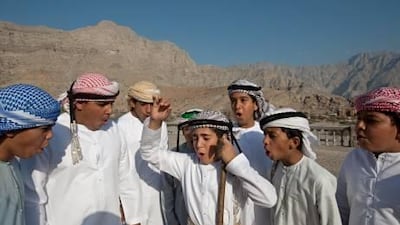RAS AL KHAIMAH // With dozens of men huddled around him, Saif Al Nar raises his axe to his left ear and quivers his cupped right hand back and forth across his head, rousing grizzled tribesmen with dark eyes into a series of puffs and grunts.
Saif is an unlikely leader for grey-whiskered, rifle-bearing tribesmen. At nine years old, the only marks on his fair, soft face are a few freckles that dot his nose. He is years away from pimples, let alone whiskers and wrinkles.
Saif is the country's youngest war cry caller. The mountain war cry, a series of shrieks known as the nadbah, is usually led by men with raspy voices and thick mountain accents.
Saif speaks in the accent of his ancestors and although his voice has the clarity of youth it holds the raw power that makes Saif a natural nadeeb, or war cry caller.
The boy, whose name means Sword of Fire, began nadbah calling when he was six and was picked out by tribal elders as having the talent of his grandfather Ali, a nadeeb who died 15 years ago.
"Happiness and full power," says Saif, pointing to his throat. "When I do this I feel like a very strong man."
His strength will no doubt grow with age. "He is a young man but after 15 years he will become good," says his father. "His age is no problem but normally you become nadeeb after you're 20 years old, because then you're a man."
In the past, the nadeeb would yell the tribal name to chants by armed tribesmen carrying khanjar daggers and gerz axes as they approached their enemies on barren mountains. But these days, the cry of war has become a cry of peace.
Political unity means that nadbah is now reserved for celebrations, such as Eid, weddings and National Day. "It is to welcome people," says Saif. "From far away they will know that we are from here," he gestures to Al Jeer mountain and its boulders that overlook his village. "All the people in the mountains will know who we are."
The nadbah has experienced a revival in the past 10 years with growing support for cultural heritage from government and folklore societies. Saif's cousin, who is 25, did not learn it. But among Saif's generation, the nadbah is key to popularity in the school playground.
When one is spotted banging the drums and singing, it is not long before others arrive, carrying canes and drums, to practise at Bani Zaidi, the base of Jebel Jeer between its boulders and graveyard.
Saif's friend, Sulaiman Mohammed, a Grade 7 pupil, describes the nadbah as "happiness from the throat". Sulaiman, who is 12, is himself a caller whose grandfather was renowned as a "perfect nadeeb".
"A nadeeb must study well and train all the time for perfection," says Sulaiman. "Saif is good because he studies well."
But not all the time: the gregarious Grade 5 pupil at Al Shaam School can be a handful in the classroom. "Many teachers talk with me, they tell me: 'Saif will not sit'," says his father with evident frustration.
Saif encompasses the tight line between modernity and tradition. He keeps his iPhone under his golden pistol halter. For special occasions, he wears a checked ghutra with the distinctive metal and tweezers attached to the end of his goat-hair iqal, an accessory worn by mountain tribes for removing thorns.
"If the father is strong, the power comes from him," says Salam.
Perhaps this is the secret to Saif's strength. His uncle Mohammed says the family name Al Nar, or The Fire, comes from a great-grandfather. "My grandfather was a very hot man but that was more than 100 years ago," says Mohammed.
"He was always making problems," teases a friend. "Maybe he ate too much fish and dates."
Saif's favourite food is mountain honey, which is good for the throat.
"We understand nadbah when we watch one another," says his father Salam. "This nadbah makes a good man and a family man."
@ For more on RAS AL KHAIMAH visit thenational.ae/topics

